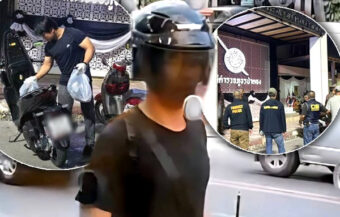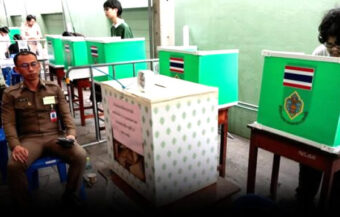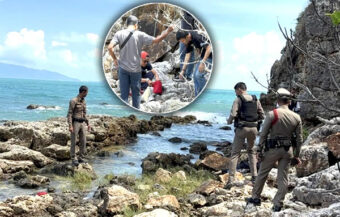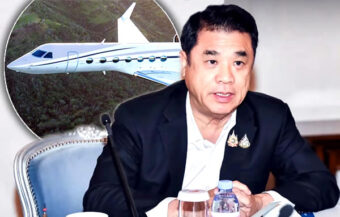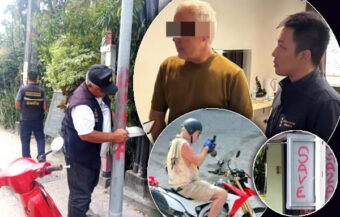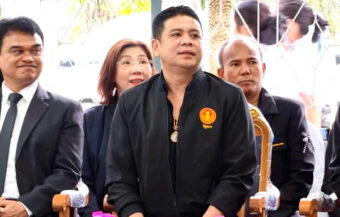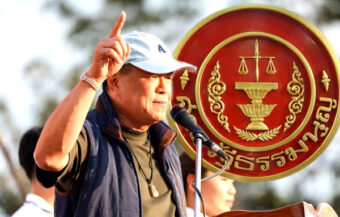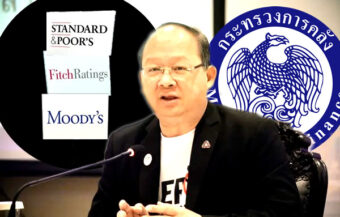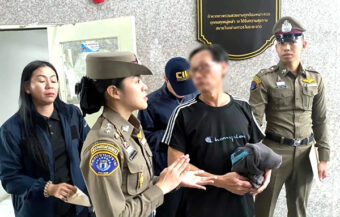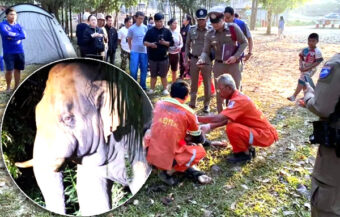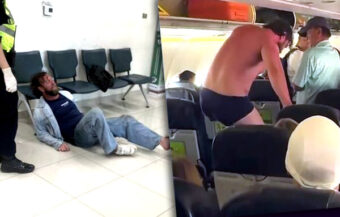A Thai soldier lost his left foot and two others were injured by Cambodian PMN-2 landmines while patrolling Sisaket’s tense border. Cambodia denies new mines amid ceasefire talks. Injured soldiers airlifted to hospital as tensions rise over disputed territory.
A Thai soldier lost his left foot, and two comrades were wounded while patrolling the tense border with Cambodia on Saturday morning. The team was laying razor wire to enforce the shaky permanent ceasefire agreed last Thursday in Kuala Lumpur. Crucially, Cambodia’s illegal use of PMN-2 landmines was a major stumbling block during the General Border Committee talks, brokered by Malaysia and attended by military officials from China and the U.S. By Saturday afternoon, Thai military sources confirmed all injured soldiers had been airlifted to hospital.
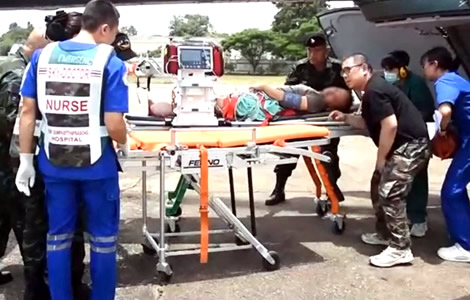
Three Thai soldiers were injured on Saturday morning after stepping on newly planted Russian-made PMN-2 landmines. These mines are believed to have been positioned by Cambodian forces, violating the Ottawa Treaty, which bans anti-personnel mines. The incident occurred around 10 a.m. in the Chong Don Ao-Krissana border area, about 1.8 kilometres from Phu Makua, located in Kantharalak district of Si Sa Ket province.
The soldiers were part of Infantry Company 111, conducting a routine patrol to lay barbed wire fencing and secure the disputed border region. Sgt Maj First Class Thani Paha led the three-man patrol. While inspecting the route, the team inadvertently triggered one of the newly laid mines.
Sgt Maj Thani suffers severe injury, losing left foot, while two privates sustained serious wounds in blast
As a result, Sgt Maj Thani suffered a severe injury, losing his left foot in the explosion. Meanwhile, Private Pakpoom Chaisura sustained shrapnel wounds to his arm and back. Private Thananchai Kraiwong suffered a concussion and ruptured eardrum from the blast.
Following the explosion, nearby soldiers rushed to aid the wounded men. Medical teams stabilised the injured before evacuating them by helicopter. Sgt Maj Thani was airlifted to Kantharalak District Hospital initially, and subsequently transferred to Sapphasitthiprasong Camp Hospital in Ubon Ratchathani for specialised care.
Fortunately, doctors have reported that all three soldiers are out of immediate danger. Nevertheless, they will remain under close observation to monitor for any complications during recovery.
This incident marks the fourth time since mid-July that Thai soldiers have been injured by landmines in disputed border areas. The army states that previous blasts were also caused by mines recently laid by Cambodian forces. The affected patrol route is a regular area for Thai military patrols and lies well within Thai territory.
The Thai Ministry of Foreign Affairs quickly lodged a formal protest with Cambodia. Officials accused Cambodian forces of violating international agreements, including the Ottawa Treaty. However, Cambodian authorities have outright denied these accusations.
Cambodia denies new mine laying claims, insisting injured soldiers hit old mines planted before conflict
Heng Ratana, Director of the Cambodian Mine Clearance Operations Centre, insisted that the Thai soldiers were victims of old landmines planted before the current border conflict. He maintained that no new mines had been laid by Cambodia recently.
Nevertheless, the Thai army refuted this claim. On the same day as the incident, an engineering unit discovered 18 Russian-made PMN-2 mines in mint condition at a former Cambodian military emplacement near Phu Makua. Of these, sixteen mines were still sealed in sacks and not yet armed. However, two were hastily placed and ready to detonate. This location had been overtaken during the five-day border clash in late July.
In addition to the mines, troops uncovered large quantities of grenade launcher rounds and RPG rockets. An army spokesman emphasised that the mines’ pristine condition indicated recent placement. Therefore, they could not have been left from prior conflicts or older deployments. This finding contradicted Cambodia’s claims of old mines causing the injuries.
Moreover, the area where the incident occurred had been cleared just five days earlier. The army engineering unit had conducted thorough mine clearance and reinforced security in the region. Thus, the Thai military strongly believes that these mines were laid very recently by opposing forces.
Ongoing border dispute centres on illegal landmine use and economic tensions around scam compounds
The ongoing border dispute between Thailand and Cambodia has centred on contested territory around the eastern provinces. Both sides accuse each other of aggressive incursions and violations of ceasefire agreements.
Notably, one of the two unresolved points in last Thursday’s 13-point permanent ceasefire plan was the issue of illegal landmine use. Cambodia refused to discuss this matter during the talks, further straining relations.
Additionally, Cambodia declined to address concerns related to its massive scammer compound industry in the region. Many observers view this industry as being at the heart of the current crisis. The sites were previously situated near the contested border zones, but lately have been moved to new inland locations. Certainly, they hold significant economic value, with a recent United Nations report suggesting up to 50% of Cambodia’s GDP derives from them. The existence of this activity remains a key flashpoint between the two countries.
Security analysts warn that the use of landmines may be intended to deter Thai patrols. Such tactics could allow Cambodia to underhandedly dominate territorial control. The message from Cambodia’s leadership is that border instability is linked to operations against the scammer industry, which was the subject of a Thai crackdown earlier this year.
Thailand is being threatened with instability in its border provinces, while Cambodia’s vital criminal compounds are jeopardised. Conveniently, the Cambodian regime denies both the recent use of landmines and its complicity in the scam compounds.
Thailand lodges complaints about illegal mines and missile strikes against civilians at international forums
Meanwhile, Thailand is determined to escalate Cambodia’s use of illegal landmines and missiles on civilians at multiple levels. Officials plan to present evidence of Cambodia’s mine-laying to international monitoring bodies and regional security forums.
Furthermore, the Ministry of Foreign Affairs continues to investigate missile strikes against civilian populations. These attacks, which occurred from July 24th to 28th, caused extensive damage to homes, schools and farmlands in border districts.
The indiscriminate use of missiles and mines has drawn condemnation from humanitarian organisations. These groups fear that continued violence will increase civilian casualties and destabilise the region further. Consequently, they have called for urgent negotiations focused on ceasefire enforcement and comprehensive mine clearance.
Thai military commanders have ordered increased patrols along the disputed border areas. They have also instructed engineering teams to conduct more frequent sweeps to detect and remove mines. Moreover, local villagers have been warned to avoid certain paths and agricultural zones until the area is declared safe.
Injured soldiers require extended treatment with hope for recovery amid the ongoing border conflict
The three soldiers injured on Saturday will require extended medical treatment. Sgt Maj Thani faces further surgeries to treat his injuries and undergo rehabilitation. Privates Pakpoom Chaisura and Thananchai Kraiwong will also continue receiving care for their wounds and concussions.
Despite these challenges, medical staff remain optimistic about their recoveries. Certainly, this latest mine blast underlines the ongoing dangers faced by soldiers and civilians along the Thai-Cambodian border. While the injured men are stable, political tensions have again been raised.
The failure to resolve disputes over landmine use and border demarcation threatens to ignite further clashes.
13-point ceasefire deal inked between Cambodia and Thailand. Some think it may still be a phoney peace
Charged situation – Defence chiefs from Thailand and Cambodia meet in Kuala Lumpur. ASEAN damaged
Nevertheless, many hope that renewed diplomatic efforts and international involvement can prevent escalation. Of course, the problem is that the agenda on the Cambodian side is hidden from view, just like the deadly Russian mines it continues to plant. Thailand must bring both into the open and before the world.
Join the Thai News forum, follow Thai Examiner on Facebook here
Receive all our stories as they come out on Telegram here
Follow Thai Examiner here
Further reading:
Charged situation – Defence chiefs from Thailand and Cambodia meet in Kuala Lumpur. ASEAN damaged
Fear on Eastern border under Martial law. Cambodian Bond nabbed on ฿162 a day from Phnom Penh regime
Cabinet meets after Cambodian ceasefire. Acting PM Phumtham spoke later with Trump for 30 minutes
Acting PM travels to Kuala Lumpur for ceasefire talks. Cambodia’s PM Hun Manet to attend amid PR war
Hot War rages on the Thai-Cambodian border following Cambodian troops offensive in Chong Bok area



